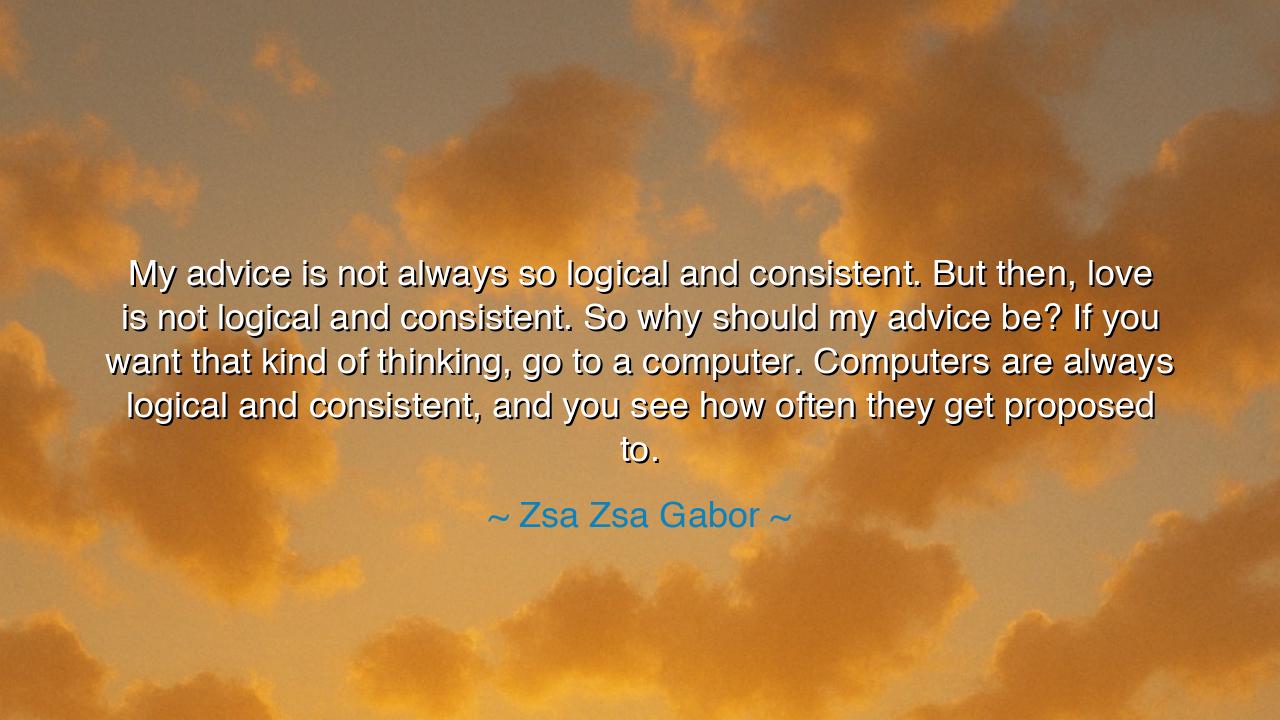
My advice is not always so logical and consistent. But then, love
My advice is not always so logical and consistent. But then, love is not logical and consistent. So why should my advice be? If you want that kind of thinking, go to a computer. Computers are always logical and consistent, and you see how often they get proposed to.






In the complex dance of human emotions and decisions, there is one force that defies all attempts to rationalize it—love. The great actress and personality Zsa Zsa Gabor, with her characteristic wit and charm, captured the heart of this contradiction when she said, "My advice is not always so logical and consistent. But then, love is not logical and consistent. So why should my advice be? If you want that kind of thinking, go to a computer. Computers are always logical and consistent, and you see how often they get proposed to." Gabor’s words are not merely a playful jest; they reveal a profound truth about the nature of love, human decision-making, and the tension between reason and emotion.
From the dawn of civilization, philosophers have grappled with the nature of love and reason. The ancient Greeks divided thought into two distinct categories: logos, the realm of reason and logic, and eros, the realm of passion and emotion. While logos was revered for its clarity and consistency, eros was seen as an unpredictable and powerful force that could neither be contained nor fully understood. Socrates, the great philosopher, taught that reason must guide us toward truth, yet he himself often found that love and passion led him into uncharted realms, beyond the grasp of reason. Gabor’s words echo this ancient dilemma—that love, the most powerful of human forces, does not adhere to the rules of logic, and neither should the advice we offer about it.
Consider the story of Romeo and Juliet, the ill-fated lovers of Shakespeare’s timeless tragedy. Their love, as intense as it was, was driven by forces beyond their control. It was neither logical nor consistent—they loved each other without regard for the hatred between their families, and they chose to follow their hearts even when reason would have urged them to turn away. Their passion led them down a path of fate that logic could never have predicted. Like their love, Gabor’s advice is not meant to be measured by the standard of logic, but by the human experience itself—a force that, like love, cannot always be tamed by reason or consistency.
In our own lives, we often encounter moments when reason and emotion come into direct conflict. There are those who seek to make every decision through the lens of logic, calculating every step with precision, as one might plan a journey with a compass and a map. But when it comes to matters of the heart, these tools fall short. Love, in its truest form, demands risk and uncertainty—it asks us to step into the unknown without a guarantee of safety or outcome. In this sense, Gabor’s advice mirrors the ancient wisdom: love, in all its forms, is a force that cannot be reduced to simple equations or rational calculations.
Let us reflect upon the example of Cleopatra, the queen whose life was marked by both political astuteness and passionate love. She was not a woman to be ruled by mere logic; her relationships with Julius Caesar and Mark Antony were driven by emotion as much as by strategy. These affairs were neither logical nor consistent, and yet they shaped the fate of nations. Cleopatra’s story is a powerful reminder that the choices we make in love are often governed by forces beyond the grasp of reason. Gabor’s words serve as a modern parallel: if we seek only logic in matters of the heart, we risk missing the deeper currents that guide us, those that are often unpredictable and irrational.
Thus, the wisdom in Gabor’s playful comment lies in its acknowledgment of the tension between logic and emotion, between the predictable world of computers and the unpredictable realm of love. Computers, as she notes, are indeed logical and consistent—but they lack the spark of humanity that makes love so rich and transformative. A computer may calculate the optimal path to a goal, but it cannot understand the feeling that drives a person to choose that goal in the first place. The heart leads us on paths that reason cannot always explain, and it is this aspect of life that gives it its beauty and depth.
The lesson we must take from Gabor’s words is one of balance. While reason and logic have their place, they must not be the sole guides in our lives. Love, in all its forms, is the force that drives us to take risks, to follow our hearts, and to make choices that defy all sense of reason. So, too, must we be willing to embrace the irrational moments in our own lives, to let our hearts guide us even when the path ahead is unclear. In a world that often demands certainty and consistency, let us remember that sometimes it is the unexpected, the imperfect, and the emotional that lead us to the most meaningful journeys.






AAdministratorAdministrator
Welcome, honored guests. Please leave a comment, we will respond soon